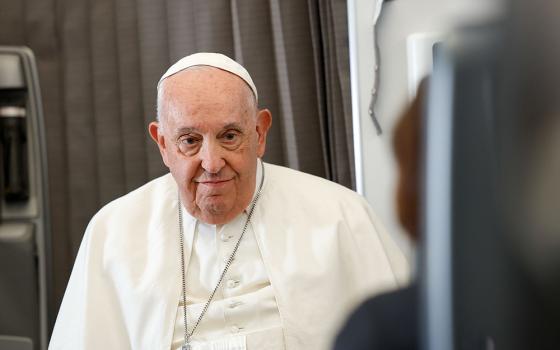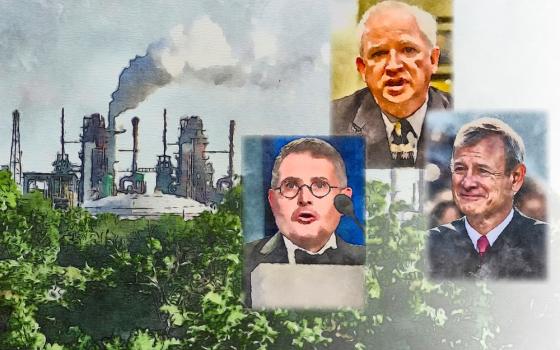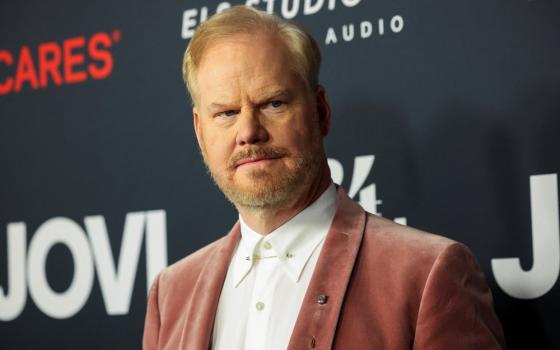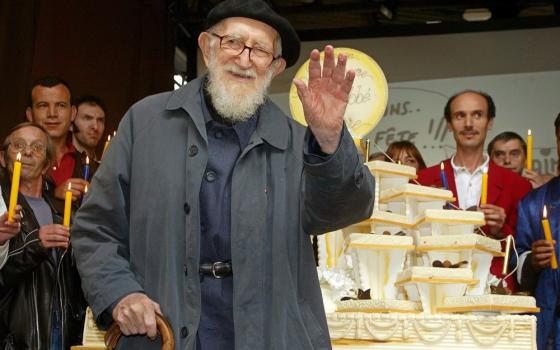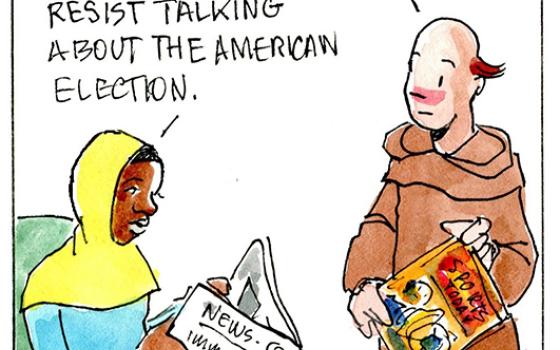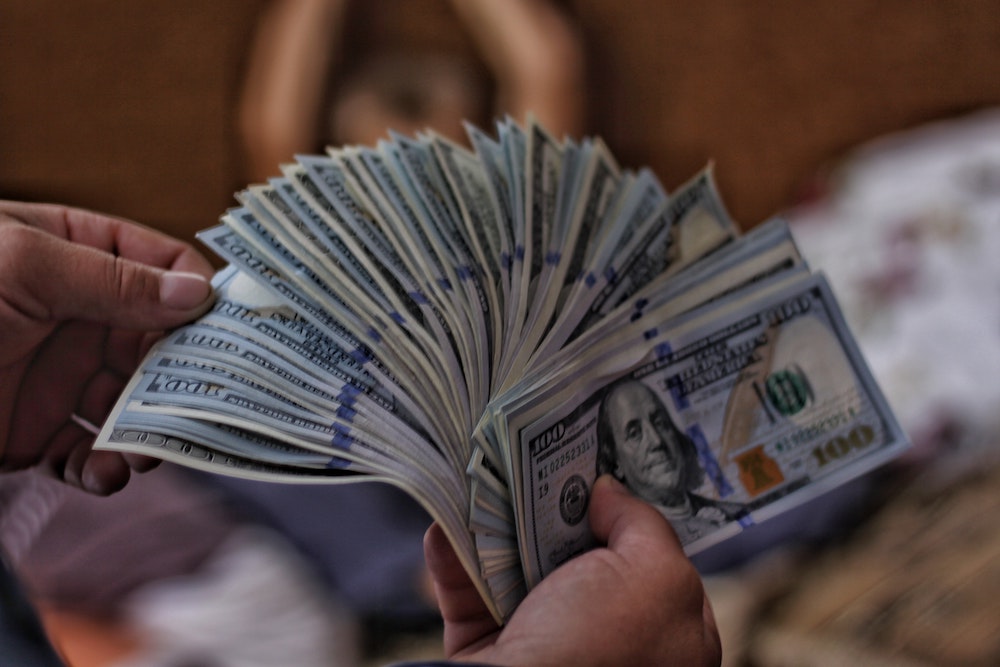
(Unsplash/Viacheslav Bublyk)
Like toxic water infiltrating and poisoning an aquifer, the influence of money in our culture and in our church is everywhere, and everywhere pernicious. Joseph J. Dunn's article in America Feb. 13, "Without the philanthropy of billionaires, the poor would suffer more and for longer," is only the latest in a long line of obsequious surrenders to the phenomenon when resistance is demanded.
Dunn begins with a story about Tore Godal and his long career helping to combat diseases in the developing world. Godal relates a story about turning to Bill Gates for funding for a vaccination project, and within a month, Gates had pledged $750 million to the project. The project, even as we speak, is helping do wonderful things around the world like stockpiling Ebola vaccines in case of another pandemic. Dunn offers the moral of his story:
Mr. Gates's huge, decisive financial investment in Dr. Godal's proposal came at a time when few government leaders paid much attention to third-world health problems. For 20 years, the benefits of that decision have accrued to people in developing countries, and this has made the world safer. Philanthropy often achieves its greatest successes in just this way, by supporting a cause that does not yet have the wide public support needed to spur government action. Without the responsiveness, decisiveness and creativity of private philanthropy, those living at the margins would wait longer for solutions and suffer more.
Dunn does not seem overly inquisitive about this lesson. For example, he does not ask: What if Gates had said "no?" Or what if Gates was a bigot and used his enormous financial power for ends that were less noble? The Koch brothers have used their vast fortune to spread pernicious economic theories, destroy unions, make it harder for poor folk to vote, among other nasty causes. For every incident of good philanthropy, it is surely possible to find others that are more questionable.
Advertisement
Dunn credits philanthropists with a long history of social agitation. But not once does he inquire, or even admit it is valid to inquire, about the source of the philanthropists' income. Am I the only person that cannot bring myself to visit The Frick Collection in New York City, considering it was built through the philanthropy of a union-busting thug? I suppose it is a good thing that Andrew Carnegie built all those libraries, but he was able to accomplish it only because Henry Clay Frick had crushed efforts to unionize at his steel factories, among other unseemly business practices.
Dunn does pose the question of whether or not the fate of millions should really be left to the decision of one very wealthy man, citing articles that raise questions about the culture of philanthropy. Strangely, Dunn shoves the discussion into a binary choice of public-versus-private philanthropy. No deep shift in public opinion has been more oppositional to Catholic social teaching in my lifetime than the diminishment of the idea that there are public goods that the public should seek to meet. Supply side economics is a close second. Both shifts took flight during the disastrous presidency of Ronald Reagan, and both find their source in the "poisoned spring" of libertarian thinking, to borrow a phrase from Pope Pius XI. The failure to appreciate public ends has stalked the discussion of Medicare-for-all and free public college, and it stalks Dunn's article from start to finish.
Apart from public spending, if wealth were more evenly distributed, might not all of us, and not just Bill and Melinda Gates, get to decide to whom we wish to donate our pennies? Even the Philanthropic Roundtable reported that the poor tend to give more of their income than the rich, and both rich and poor give more than the middle-class. But, as one friend pointed out after reading the piece by Dunn, we should really measure philanthropy by what the person has leftover after the donation. Cf. Luke 21:1-4.
The single greatest correlation between philanthropy and other activities? People who practice religion regularly are the most generous, or at any rate, they give the most, perhaps because they are instructed to do so by God, perhaps because their churches and synagogues and mosques offer them many ways to give. Those who are married are much more likely to give than those who are not, according to several studies. Those in the South give the most — unsurprisingly because that is where religious observance is the greatest — and those in New England the least. I would add something nasty about Calvin here, but that is another essay for another time.
There is no punting on the question of how changes in the nature of philanthropy have come to distort the life of the church, although Dunn seems unconcerned about that. One hundred years ago, Cardinal James Gibbons did not have to spend a significant amount of his time sucking up to rich folk to make donations for the work of the church. Fifty years ago, a second collection was still enough to fund the church and her ministries. Now? I am guessing many bishops spend more nights out at dinners with big donors than they do with other clergy, with seminarians, or with young men and women discerning a vocation. Catholic colleges have boards filled with wealthy men and women who are not likely to object when the school decides it does not want to allow its professors to organize a union. If you want a building named after you, better to make a ton of money than to become a saint: Bonaventure Hall is no more, but the Busch School of Business thrives.
A billionaire is president. Another billionaire owns The Washington Post and is fast-destroying small businesses around the world unless they are willing to send their products through Amazon. Another billionaire wants to be the Democratic nominee. Lesser monetary luminaries who happen to have purchased a sports franchise extort fancy new stadiums from struggling cities in order to build more skyboxes for their corporate pals. Planes have business class as well as first class as well as premium economy. And we wonder why there is a shortage of social solidarity?
"Last Holiday," starring Queen Latifah is one of my favorite Yuletide movies. In it, she describes the rich people who populate the Swiss Alpine resort she is at by saying, "They are not bad people. They're greedy people. They want a little of this and a little of that." She was explaining why a man was cheating on his wife, but she could have been describing American culture today. The rich are no longer content to dominate the halls of commerce. Now they wish to dominate other sectors of society. Collectively we need to stand up and say, "No." We may not succeed, but we must try. As Jesus said, "The rich you will always have with you."
[Michael Sean Winters covers the nexus of religion and politics for NCR.]
Editor's note: Don't miss out on Michael Sean Winters' latest. Sign up and we'll let you know when he publishes new Distinctly Catholic columns.

